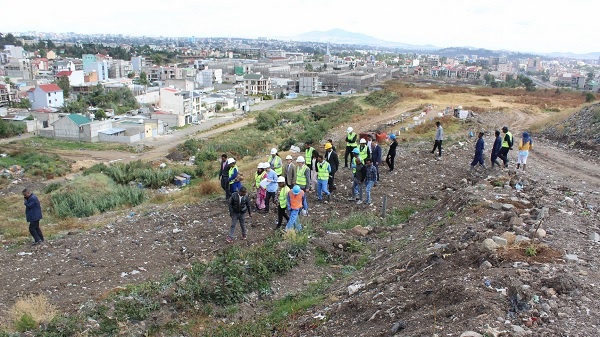
The objective of the Koshe/Reppie dumpsite rehabilitation project is to contribute to the establishment of resilient, safe and sustainable environmental administration systems for Addis Ababa
ADDIS ABABA (UN-Habitat Ethiopia) – Addis Ababa, Ethiopia’s capital with its 3.4 million population, is the seat of important institutions such as the African Union (AU), Economic Commission for Africa (ECA) and more than one hundred embassies and diplomatic missions. The city is currently undergoing major and rapid changes spatially and economically due to increased industrial and commercial investments, infrastructural development and a construction boom that is fundamentally changing the character of the city, with both positive and negative consequences.
In Addis Ababa, solid waste management (SWM) is no more a usual problem. The city with its rapid growth rate uses the Koshe/Reppi dump site, which covers an area of about 36 hectares located in a densely populated area, since about 50 years. Surrounding residents are facing enormous difficulties caused by over-usage of the dump site, such as overflow of leachate ponds and toxic smells. While this has long been recognized as a serious chronic environmental, social and economic issue for the city & its residents, on 11 March 2017, it has erupted as an unpredictable humanitarian disaster when a collapse of a substantial part of the dumpsite (landslide) provoked by methane-induced explosions, taking nearly two hundred lives as houses were built directly on the slopes of the dump site and close to the site.
As Koshe is the only operational waste dump site serving the entire 3.4 million population of Addis Ababa, further collapse or explosion will place the city at a social, economic and sanitation risks; and will complicate the city’s urban basic service delivery. Hence, through the rehabilitation and stabilization of the dump site social, economic and sanitation risks to the entire population of Addis Ababa are reduced and the city’s urban basic service delivery is improved.
The Fukuoka Method is a semi-aerobic landfill solution developed in the early 1970’s in Japan through a joint partnership of the City of Fukuoka and Fukuoka University, which later became the country’s standard landfill system as per the guidelines issued by Japan’s Ministry of Health and Welfare. Currently, in addition to being the standard landfill system in Japan and having been officially recognized internationally, the Fukuoka Method has been introduced and practiced in over 13 countries around the world as the method has offers a number of advantages, such as low cost and locally-adaptable technology, low maintenance costs and environmentally-friendliness. In addition, training programs have been delivered inside and outside Japan targeting trainees coming from over 100 countries.
In 2015 the Fukuoka Method was successfully implemented for the first time in Africa with UN-Habitat support in Kiambu County in Kenya.
Objective of the Koshe/Reppie dumpsite rehabilitation project
The objective of the project is to contribute to the establishment of resilient, safe and sustainable environmental administration systems for Addis Ababa city through the implementation of the Fukuoka Method of Solid Waste Management; specifically to:
- rehabilitate the collapsed area of the Koshe dump site to prevent further erosion and landslide over the surrounding settlements,
- stabilize the existing main area of the Koshe dump site to prevent further collapse and methane gas explosion which is now at higher risk of occurrence with larger impact to the surrounding residential area,
- provide technical support to Addis Ababa City Government to control the environmental and socio-economic risks with increased efficiency and develop safer coexisting systems with an estimated number of 2,000 waste pickers, among them many women and youths.
Partners of the Koshe/Reppie dumpsite rehabilitation project
The United Nations Human Settlements Programme (UN-Habitat); Addis Ababa City Government; FDRE Ministry of Urban Development and Housing; FDRE Ministry of Forestry and Environmental Resources; Solid Waste Advisory Network (SWAN) Fukuoka (Japan); and Fukuoka University (Fukuoka, Japan).
Source: UN-Habitat Ethiopia
